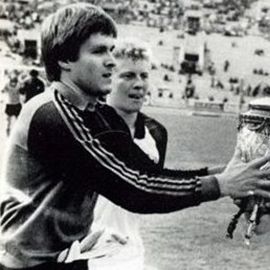
He developed at Dynamo Kiev under the late and great Lobanovsky and his career reached its peak in 1988. Or would have done had he not been struck by injury. Baltacha did not appear until the final against Holland in Munich, when he came on as a substitute midway through the second half, about a quarter of an hour after Marco van Basten had scored one of the most cherished goals of all time. We were talking about it last week at the Church of England school in Rotherhithe, London, where Baltacha teaches PE and I asked if the moment when Van Basten's volley flew in a blur past Rinat Dasaev, putting the Dutch two up, had signalled the end of Soviet hope.
"No,'' he replied. "That was when Igor Belanov missed a penalty.'' Baltacha grimaced. "At 2-1 it might have been a contest. But you get disappointments and I'd been lucky throughout my professional life because I'd been in a group of players who had won nearly everything. It started with the Under-19 World Cup. There were seven of us from Dynamo Kiev and we moved up to the full national team. We were like brothers -Dasaev, Andriy Bal, Vladimir Bessonov and the rest, tremendous players and tremendous people. We really thought we could win that tournament in Germany.''
After they had instead watched Ruud Gullit brandish the trophy at the orange hordes in the Olympic Stadium, Baltacha moved to Ipswich. Perestroika was in the air and the Soviet sporting authorities had decided to reward players who had given long service to the national team by allowing them to transfer abroad. Baltacha chose Ipswich rather than the Swiss club Neuchatel Xamax even though he spoke little English: "I had only two phrases - 'Fasten seat belts', from flying, and 'No problem'. My nickname was 'Serhiy No Problem' because when anybody said anything to me I'd reply, 'No problem'. But the club paid for lessons and I soon learned the language.
"But my two years at Ipswich were not happy football-wise. It was not football as I'd known it. All my life I had played as a sweeper or a marking defender in front of a sweeper. But no one in England used that system at the time. It was just a back four, pushing up all the time and the long ball. I was in shock! So I told my agent to find me a club who used a sweeper - otherwise I'd just go home - and he did. The only one in Britain.
"St Johnstone had just been promoted to the Scottish Premier League and my agent told me they were a good club in a good town [Perth] with a new stadium. I had three really great years there under Alex Totten, who liked and understood the sweeper system, and kept on my house in Perth after moving to Inverness to be manager of Caley Thistle. In all, I lived there for 10 years.''
His children thrived too; Serhiy Jnr was to become a professional footballer and Elena, at one stage, Britain's top woman tennis player (though both were also to suffer from back problems inherited from their father).
After a spell coaching in Kiev, Baltacha returned to assist Tony Fitzpatrick at St Mirren and worked for the Scottish FA. He moved to London to be closer to Elena when tennis took her south and now combines his teaching with four stints a week at Charlton Athletic's academy. Serhiy Jnr, who played for Scotland Under-21s when with St Mirren, moved to Millwall but shortly afterwards encountered the problems that were prematurely to end his career.
"He's been very unlucky,'' said Baltacha. "When he was 18, he was better and more athletic than I had been at the same age. But Dynamo Kiev made me the player I was to become. Serhiy could have had a similar education, because he was wanted by Arsene Wenger at Arsenal - but St Mirren asked for too much money and the deal fell through.''
Baltacha had the privilege of a long career. He went to the World Cup in 1982 and figured largely in the achievements of Lobanovsky's Dynamo Kiev, winning the European Cup-Winners' Cup in 1986 and reaching the European Cup semi-finals the following year. So the Kiev-based Soviet Union went to the 1988 European Championship in good heart and, after easily beating a listless England, gained in momentum to the extent that a fine Italian side featuring Franco Baresi, Gianluca Vialli and Roberto Mancini were swept aside in the semi-finals. But Gullit and Van Basten dictated it was not to be.